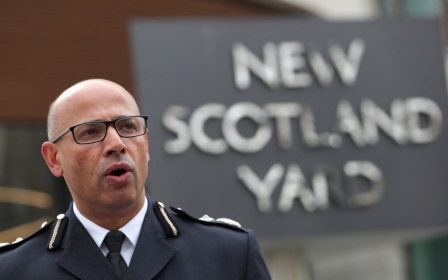Muslim organisations boycott UK government's Prevent review

Leading British Muslim civil society organisations and mosques said on Wednesday they would boycott a review of the government's Prevent counter-terrorism strategy over the appointment of William Shawcross.
In a statement, the coalition of more than 450 organisations and 90 prominent community figures including scholars and academics said that Shawcross had a “track record of hostility to Islam and Muslims”.
“No serious, objective, critical review can be undertaken by someone with such a track record – rather we should expect him to promote a hardening of policies towards Muslims. So, if Muslim organisations engage with this Review, it strengthens its legitimacy and its power to recommend policies more harmful to the community,” the statement said.
Organisations that signed the statement include the Federation of Student Islamic Societies, the Muslim Association of Britain, the Association of Muslim Lawyers and the Islamic Human Rights Commission, as well as regional organisations representing mosques in England and Scotland.
The boycott is the second to be announced since Shawcross's controversial appointment to conduct the long-delayed review in January.
Last month, leading human rights and civil liberties organisations including Amnesty International and Liberty said they would not engage with the review over concerns the government was using the process to “whitewash” Prevent.
Layla Aitlhadj, director of PreventWatch, which supports people affected by the strategy, said: “The review lacks credibility, its current reviewer, William Shawcross, is seen as partisan, and the government has no intention of taking our concerns seriously. In short, this government cannot be trusted to make a truly independent and comprehensive assessment of Prevent.”
Criticism of Shawcross's appointment has focused on comments he made in a speech in 2012 in which he described Islam as “one of the greatest, most terrifying problems of our future”.
At the time Shawcross, a journalist and author, was director of the Henry Jackson Society, a controversial neoconservative thinktank.
Shawcross subsequently led the Charity Commission from 2012 to 2018, during which time the regulator was accused of unfairly targeting Muslim charities, many of which were involved in sending aid to Syria. The commission denied targeting Muslims or any other religion or type of charity.
In a letter to the Guardian last month addressing criticism of his appointment, Shawcross said he had in his past work “attempted to deal head-on with the thorny moral and legal issues that emerged as the West responded to the threat of Islamist terrorism after 9/11".
“This has led to some of my views being misrepresented or misinterpreted,” he said.
Critics of Prevent say that the strategy disproportionately targets Muslims and point to concerns raised by human rights groups, Muslim community organisations and United Nations special rapporteurs.
What is the Prevent Strategy?
+ Show - HidePrevent is a programme within the British government's counter-terrorism strategy that aims to “safeguard and support those vulnerable to radicalisation, to stop them from becoming terrorists or supporting terrorism”.
It was publicly launched in the aftermath of the 2005 London bombings and was initially targeted squarely at Muslim communities, prompting continuing complaints of discrimination and concerns that the programme was being used to collect intelligence.
In 2011, Prevent's remit was expanded to cover all forms of extremism, defined by the government as “vocal or active opposition to fundamental British values, including democracy, the rule of law, individual liberty and mutual respect and tolerance of different faiths and beliefs.”
In 2015, the government introduced the Prevent Duty which requires public sector workers including doctors, teachers and even nursery staff to have “due regard to the need to prevent people being drawn into terrorism”.
A key element of Prevent is Channel, a programme that offers mentoring and support to people assessed to be at risk of becoming terrorists. Prevent referrals of some young children have proved contentious. 114 children under the age of 15 received Channel support in 2017/18.
Criticism of the Prevent Duty includes that it has had a “chilling effect” on free speech in classrooms and universities, and that it has turned public sector workers into informers who are expected to monitor pupils and patients for “signs of radicalisation”. Some critics have said that it may even be counter-productive.
Advocates argue that it is a form of safeguarding that has been effective in identifying and helping troubled individuals. They point to a growing number of far-right referrals as evidence that it is not discriminatory against Muslims.
In January 2019 the government bowed to pressure and announced that it would commission an independent review of Prevent. This was supposed to be completed by August 2020. After being forced to drop its first appointed reviewer, Lord Carlile, over his past advocacy for Prevent, it conceded that the review would be delayed.
In January 2021 it named William Shawcross as reviewer. Shawcross's appointment was also contentious and prompted many organisations to boycott the review. Further delays followed. Shawcross's review, calling for a renewed focus within Prevent on "the Islamist threat", was finally published in February 2023 - and immediately denounced by critics.
The UK government bowed to pressure for an independent review of Prevent in January 2019, but it was forced to drop its original choice of reviewer, Lord Carlile, in December 2019 following a legal challenge over the peer's past advocacy for Prevent.
The review is now due to be completed by August, but its terms of reference have still to be announced.
Critics say that a truly independent review must consider whether Prevent should be scrapped altogether. But government ministers have repeatedly suggested that the purpose of the review is to make the strategy more effective.
In its statement on Wednesday, the Muslim coalition said that Prevent had promoted “unacceptable harms” including the profiling and targeting of Muslim children, demonising aspects of Islam, and silencing legitimate speech.
“We boycott the review because Prevent disproportionately targets the civil liberties of British Muslims and demonises the Islamic faith. Prevent is counter-productive and leaves both liberty and security damaged and diminished for all British citizens and residents, not just those of the Muslim faith,” the statement said.
In a letter to Prevent practitioners last month, Shawcross indicated that he intended to build on the work of his predecessor, and said he was “open minded and want to hear all the evidence”.
“The aim of the review is to look at the effectiveness of present strategies to protect vulnerable people from being drawn into terrorism and make recommendations for the future,” he wrote.
Middle East Eye delivers independent and unrivalled coverage and analysis of the Middle East, North Africa and beyond. To learn more about republishing this content and the associated fees, please fill out this form. More about MEE can be found here.





